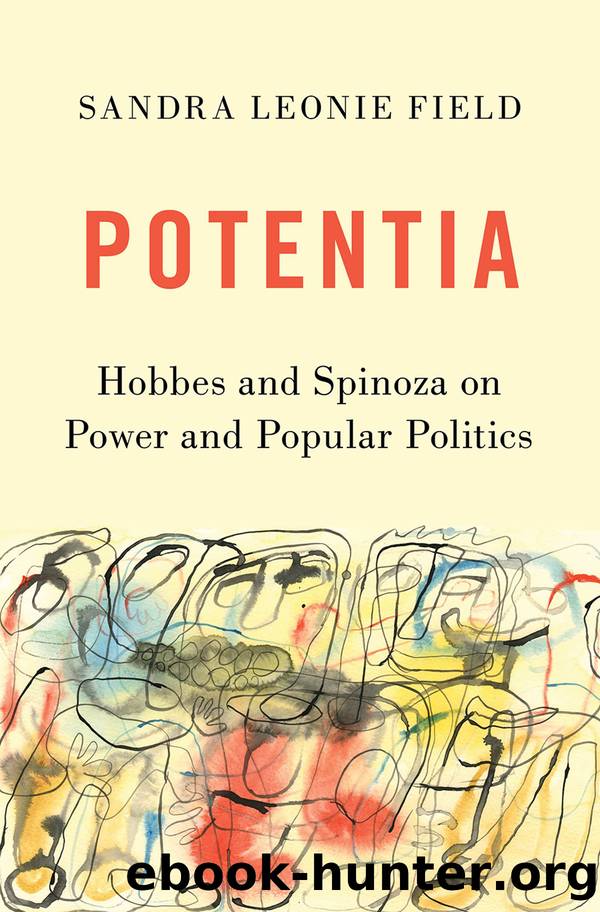Potentia by Sandra Leonie Field

Author:Sandra Leonie Field
Language: eng
Format: epub
Publisher: Oxford University Press
Published: 2020-06-15T00:00:00+00:00
* * *
1 Multitudo, multitude or crowd, is a term found in both Hobbes and Spinoza. Hobbes contrasts multitudo, as a mass of individuals without reference to juridical organization, to populus, the people as a juridically defined mass agent (DC 6.1; see my Chapter 3, Section 3.2). In Spinozaâs hands, the term appears to have a similar meaning, but it does more positive work in his politics even as its precise conceptual structure remains elusive. This has generated disagreement amongst interpreters, as I will elaborate subsequently.
2 Only the Theological-Political Treatise was published during Spinozaâs lifetime. By Curleyâs estimation, the first two parts of the Ethics were written by around 1665; the Theological-Political Treatise was completed in 1669; the remaining three parts of the Ethics were written by 1675; and the Political Treatise was still in progress at the time of Spinozaâs death in 1677, resulting in an incomplete discussion of democracy (as I will consider in detail in Chapter 9). Benedict de Spinoza, The Collected Works of Spinoza, Vol, 1, translated by Edwin Curley (Princeton, NJ: Princeton University Press, 1985), 405â406; Benedict de Spinoza, The Collected Works of Spinoza, Vol. 2, translated by Edwin Curley (Princeton, NJ: Princeton University Press, 2016), 59, 491.
3 Curley offers this only as a provisional characterization, before subsequently emphasizing deeper differences between the two thinkers and outlining Spinozaâs similarities to Machiavelli. Edwin Curley, âKissinger, Spinoza, and Genghis Khanâ, in The Cambridge Companion to Spinoza, edited by Don Garrett (New York: Cambridge University Press, 1996), 315â318, 328â333.
4 The inventory of Spinozaâs library on his death includes Hobbes, Elementa Philosophica (Jacob Freudenthal, Die Lebensgeschichte Spinozaâs in Quellenschriften, Urkunden und Nichtamtlichen Nachrichten [Leipzig: Verlag von Veit & Comp., 1899], 163). Elementa Philosophica is the title of Hobbesâs three-volume systematic presentation of his philosophy, including De Corpore, De Cive, and De Homine. It is not clear from the somewhat telegraphic inventory whether Spinoza held all three volumes; but commentators presume he held at least De Cive. Spinoza did not read English, but it is likely he had access to Leviathan: a Dutch translation appeared in 1667, and the Latin Leviathan was republished in Amsterdam in 1668. Noel Malcolm, âHobbes and Spinozaâ, Aspects of Hobbes (Oxford: Oxford University Press, 2002), 41, 47. Schoneveld claims that Spinoza had access to the in-progress Dutch translation of Leviathan while he was writing the Theological-Political Treatise. Cornelis W. Schoneveld, Intertraffic of the Mind: Studies in Seventeenth-Century Anglo-Dutch Translation (Leiden: Brill, 1983), 40.
5 Prima facie differences include a significantly diminished theoretical prominence of a social contract; the emergence of the concept of the multitude; the greater consideration of monarchy and aristocracy; the lesser attention to imagination, religion, faith; and the more minute focus on institutional design.
6 For an overview of the historical and political context of Spinozaâs writing, see footnotes 27 and 28 in Chapter 1.
7 There is a considerable literature that limits itself exclusively to the earlier Theological-Political Treatise. But of those commentaries that read the two texts together, notable accounts of the change
Download
This site does not store any files on its server. We only index and link to content provided by other sites. Please contact the content providers to delete copyright contents if any and email us, we'll remove relevant links or contents immediately.
The remains of the day by Kazuo Ishiguro(8999)
Tools of Titans by Timothy Ferriss(8396)
Giovanni's Room by James Baldwin(7346)
The Black Swan by Nassim Nicholas Taleb(7129)
Inner Engineering: A Yogi's Guide to Joy by Sadhguru(6795)
The Way of Zen by Alan W. Watts(6614)
The Power of Now: A Guide to Spiritual Enlightenment by Eckhart Tolle(5781)
Asking the Right Questions: A Guide to Critical Thinking by M. Neil Browne & Stuart M. Keeley(5775)
The Six Wives Of Henry VIII (WOMEN IN HISTORY) by Fraser Antonia(5515)
Astrophysics for People in a Hurry by Neil DeGrasse Tyson(5190)
Housekeeping by Marilynne Robinson(4447)
12 Rules for Life by Jordan B. Peterson(4304)
Ikigai by Héctor García & Francesc Miralles(4274)
Double Down (Diary of a Wimpy Kid Book 11) by Jeff Kinney(4272)
The Ethical Slut by Janet W. Hardy(4253)
Skin in the Game by Nassim Nicholas Taleb(4248)
The Art of Happiness by The Dalai Lama(4130)
Skin in the Game: Hidden Asymmetries in Daily Life by Nassim Nicholas Taleb(4007)
Walking by Henry David Thoreau(3962)
